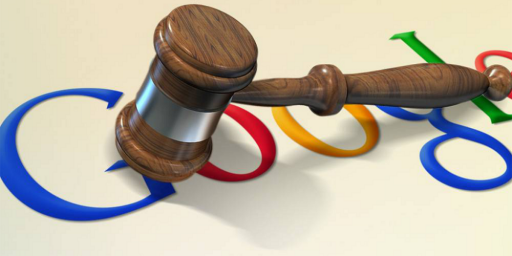Google is a Verb, Not Just a Search Engine
 E.D. Kain makes the interesting point that it may be too late for Microsoft’s bing to make much penetration into the search market, regardless of whether it’s better at producing desired results, because we’ve already reached the point where the name of the market leader has become a verb.
E.D. Kain makes the interesting point that it may be too late for Microsoft’s bing to make much penetration into the search market, regardless of whether it’s better at producing desired results, because we’ve already reached the point where the name of the market leader has become a verb.
Once something becomes a sort of universal noun, that’s bad enough. Kleenex did this in the tissue market, becoming pretty much synonymous with tissue. So whether or not you were using a generic tissue or a Kleenex, you called it a Kleenex. They transcended brand. But it’s so much more potent to achieve verb status, and that’s what Google’s done. You “google” something now — you rarely hear someone say “search.” You never hear anyone say “just ask it” or “just yahoo it” — or at least, I never do.
The only other example that comes readily to mind is “xerox” as a synonym for making photocopies. Then again, Canon and others have made quite an inroads into that business.
Kain makes a less catchy but perhaps more salient point in the comments:
Nor do they understand connectivity and product overlap the way Google does. Google connects your email, chat, documents, search, and even browser now, etc. into basically one product, and with upcoming innovations like Wave and their OS that connectivity and overlap will just become far, far more effective. (Apple has done this fairly well also with hardware added into the mix) Microsoft has tried with “Windows Live” and all that, but there are just too many gaps, too many brands, etc. I mean “bing” is now part of the whole cadre of Microsoft products, but is it really tied into them well? Why Microsoft hasn’t made their Windows platform more webby is beyond me. And why they make it so difficult to integrate everything is also confusing.
That, to me, is the real issue. Google may not be the best at anything but they’re pretty good at everything. It’s mighty convenient to have my email, calendar, task list, and whatnot in one place. They’re all good enough that I’ve stopped looking for competing apps even though there may well be something better out their for any particular product.
I sincerely hope that Microsoft — or somebody — creates a viable enough alternative to keep Google honest, though. Google’s marketplace dominance gives them an awesome amount of power in determining which websites thrive and fail, which videos get seen by the masses, and whatnot. Having a ready alternative will make it harder for them to abuse that position.






Hoover (for vacuuming) is noun and verb.
Aspirin, Frigidaire, Polaroid are other trade names that have become generic.
MS gets to count me as a Bing user because I’m giving it a long chance on my Win7 box, but I don’t think it’s better than Google. I don’t expect to use it forever.
For what it’s worth, I think Bing results are more visually appealing, but lower quality. That experience might be shaped by the fact that I’m a programmer and am using good search terms in my queries. It is possible that an average user, with bad queries, would have a different experience.
Don’t forget Dumpster and Laundromat.
I’ve always thought Kleenex Inc should change their brand to Tissue. They can change their marketing to “Tissue…the original Kleenex.”
I might try this Chrome OS on my netbook since Ebuntu is less than impressive. But then again…I might not.
If there is one thing that Microsoft does understand, it’s product overlap. That’s what has gotten them into anti-trust troubles in the past.
You might also try Moblin if your netbook is supported, that’s been the most visually impressive one I’ve seen so far. There’s also Easy Peasy if you want to keep Ubuntu.
“Why Microsoft hasn’t made their Windows platform more webby is beyond me.”
“If there is one thing that Microsoft does understand, it’s product overlap. That’s what has gotten them into anti-trust troubles in the past.”
Exactly. Microsoft’s entire desktop product line is integrated to a degree that no other software maker even comes CLOSE to. This really is a benefit to a lot of consumers. It’s *ALSO* a practice that is hyper-competitive to the point where it’s become anti-competitive.
Google is actually following the Microsoft model with its product lines, just moved from the desktop world to the web world. Microsoft has dipped its toes into this approach, and been dramatically struck down by anti-trust suits every time. At this point, its competitiveness in this market is somewhat hamstrung by anti-trust law.
I’m not sure that’s a good thing and I’m not sure that’s a bad thing. But it’s a thing, and it’s real. Furthermore, there are already anti-trust suits (or at least whisperings of such) coming in against Google, and for exactly the same reasons. It’s only a matter of time before they find themselves just as hamstrung as Microsoft, although perhaps in the “next” new big market.
The difference is that Google’s products use open standards: mail, calendar, chat, all of them can be accessed with non-Google software. I can use the same non-Google software to connect to someone else’s services and have them work just as well.
Their actual product offerings are also going open source, Android, Chrome and Chrome OS can all be modified and re-distributed by someone else, without having to pay Google a dime.
It will be very hard to convict Google of being anti-competitive, when their competition is free to interact with Google’s services, or even re-brand and re-distribute Google’s software.
There’s a great book called “breaking windows.”
MS actually suffers a ying and yang on this. They can do certain things with integration, but they must also avoid certain things to keep the profit in the synergy.
I’d guess that if you like MS integration you are an Office user, willing to pay for that. People who don’t want all roads leading to Office might feel differently.
“It will be very hard to convict Google of being anti-competitive, when their competition is free to interact with Google’s services, or even re-brand and re-distribute Google’s software.”
You can interact with Microsoft products to a VERY large degree. The standards aren’t “open” in the sense that Microsoft defines them, but they’re much more open than is often claimed. And the same argument about interacting with their stuff was made as an argument over why it would be hard to make an anti-trust claim stick with them, as well. After a certain point, it stops mattering (at least politically).
They’re not “open” in the sense that you have to pay Microsoft for either the right or the knowledge (or both) to interact with them.
That has changed in the past couple of years with Microsoft opening up their Exchange and CIFS protocols, but there are still issues like OOXML and .NET requiring patent licenses in order to fully implement.
“They’re not “open” in the sense that you have to pay Microsoft for either the right or the knowledge (or both) to interact with them.”
Not entirely, and that’s my original point. I’ve been able to make plugins for all Microsoft Office (for example) for almost 15 years. It’s entirely possible to do so without paying Microsoft a dime using 100% non-Microsoft tools (other than Office iteslf), and the documentation to do so is 100% available on their MSDN web site.
On the other hand, yes, there have been hard limits on directly accessing and manipulating their files. Hence my original qualifier: “it’s much more open than it’s made out to be” and not “it’s all completely open.”
Odd, I was thinking about this earlier today. Is anyone going to say he “binged” someone or something?
Saying “I binged Jessica Biel” sounds like one is making a rather ambitious claim.
For that matter, “Bing”? Bing cherries. Bing Crosby.
It’s like, The New Gay Search Engine. Which is a good niche to occupy, I suppose, but I had thought Microsoft aimed bigger.
I hope that google gets into the OS business so MS has to improve their product. Intel is one of the few monopolies that has kept their product improving despite minimal competition. Which is also part of why they have minimal competition because they move the bar often enough.
I haven’t kept up lately but AMD was a competitor for quite some time.
They still are a major competitor. In fact, you wouldn’t even have 64bit Intel chips if it weren’t for them licensing AMD’s technology (which is turn is based on technology AMD licensed from Intel). They also have competition from various ARM companies for CPUs, nVidia for GPU and motherboard chipsets, and others still for networking.
Becoming a “verb” is rare especially when there is competition.
Two examples I thought of basically had no competition when they achieved that status:
(1) Scotch Tape the envelope to the present.
(2) Saran Wrap the leftovers from dinner.
Who is Microsoft paying for all the good reviews on Bing? Its results are heavily weighted towards aggregators. Tried it a few times and gave up…
AMD is a competitor. Intel has about 80% of the business. AMD about 10- 12% and other players the rest. Even when going into the same application (e.g. PC), AMD tends to make less profit per unit than intel. Bottom line is that intel keeps its competitors alive just enough to keep out a monopoly suit. Microsoft has about 88% of the OS business, Apple about 10% and the rest other players. So the two are pretty analogous, just that MS has eaten more of the smaller players.
Microsoft tried to have full integration between its OS and Browser like, 10 years ago. And the Justice Department almost broke them apart like AT&T as a result.
Microsoft could easily adopt an open-source approach and remain profitable. That’s what I mean when I say they don’t understand product overlap and integration the way Google does. They go about it all wrong. They guard their code jealously, and yet here comes Google, ready to strike…
Re: Intel. For a while there AMD had them on the run, until the Israeli team developed the Core Duo architecture. Now AMD is on the run, sadly. They may come back. Netbooks and mobile computing may yet change that landscape entirely.
Really great competition takes place between Nvidia and ATI (now owned by AMD). This competition keeps GPU’s honest and up to date, though that’s also spurred on by the games. Intel had nothing like the evolution of the GPU until AMD applied pressure.
Operating systems are trickier, but honestly, the more software that goes open-source and multi-platform (and thus out of the yoke of Microsoft) the more options people will have, the less bound to one OS or another they will become. That’s been, as much as anything, the thing that’s kept OS competition down. People needed their stuff to work all across the board, and so sticking to one OS made sense. The web, open-source, etc. are changing that.